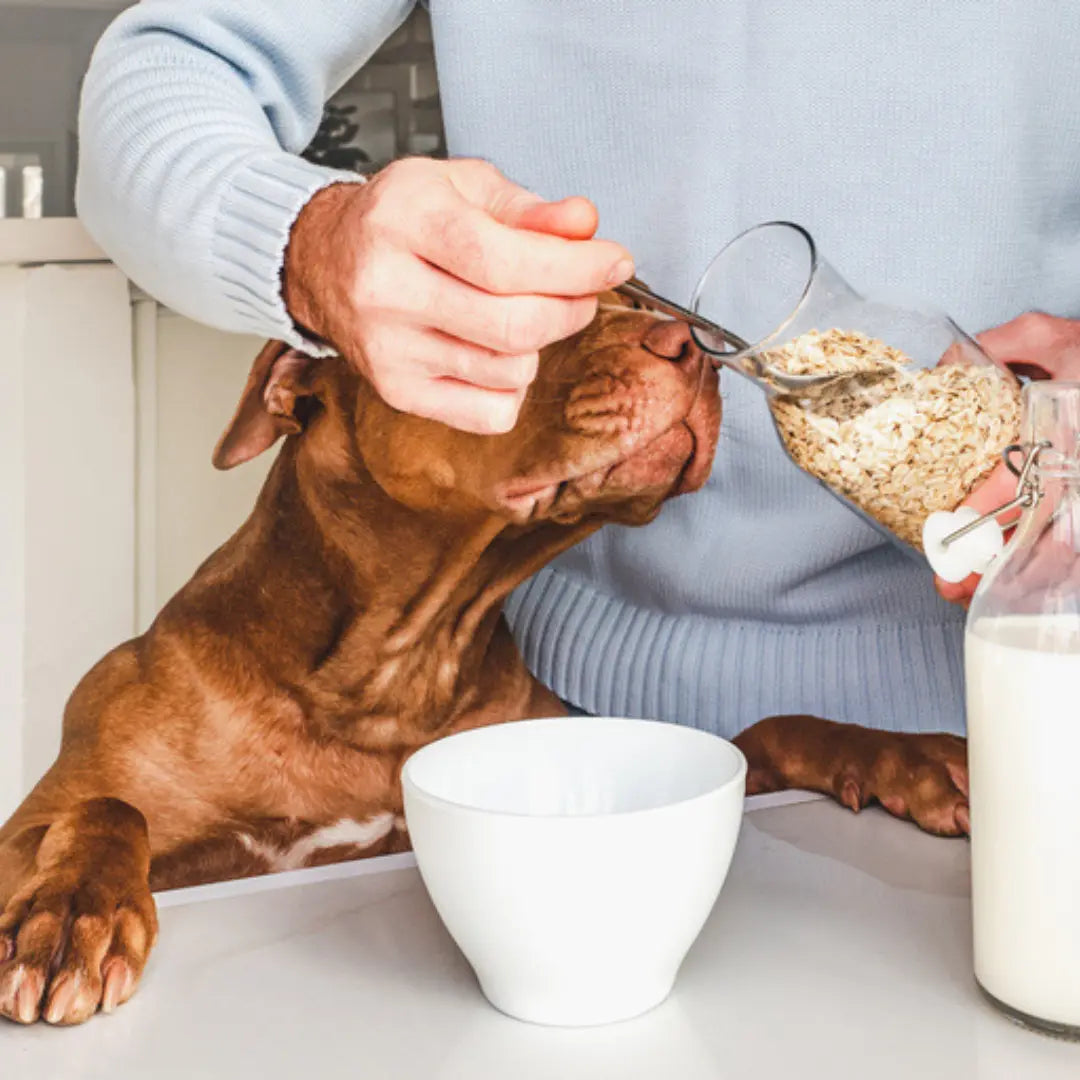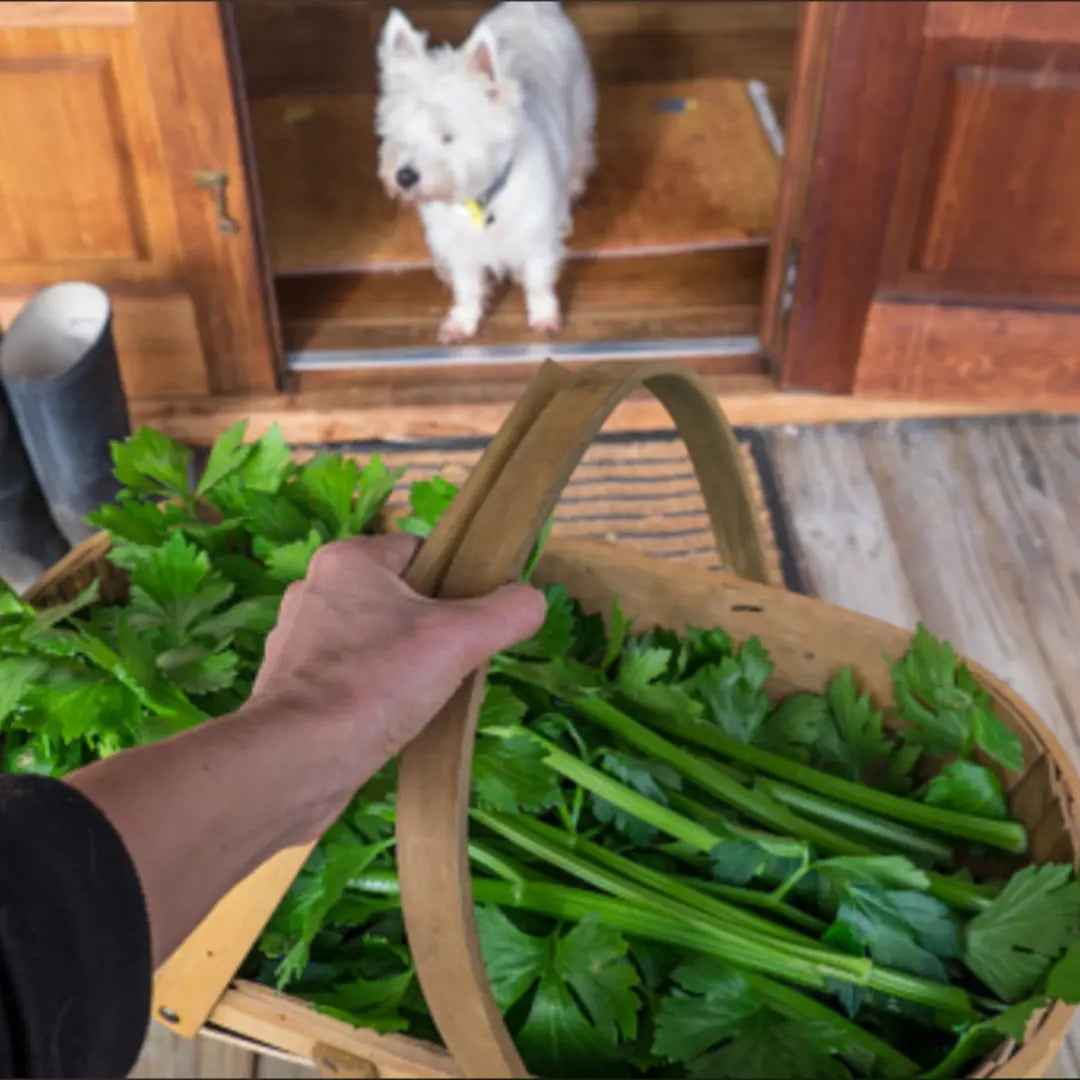Highlights of Cottage Cheese Blog for Dogs
-
Learn what cottage cheese is
-
Understanding the nutritional value of cottage cheese for dogs
-
A guide on how to feed cottage cheese to your dog
-
Recommendations, tips, and alternatives
-
Quick and easy recipes
Is Cottage Cheese Bad for Dogs?
As a dog parent, you want to give your dog the best possible nutrition. And you might be asking yourself, "Can dogs eat cottage cheese?" Well, the good news is that dogs can safely enjoy small amounts of cottage cheese as an occasional treat. Not only is it a tasty snack for your pup, but it also provides some health benefits. However, before adding cottage cheese to your dog’s food, it's important to understand its nutritional value and potential risks. In this blog post, we'll explore everything you need to know about feeding cottage cheese to your dog.
What is Cottage Cheese
Cottage cheese is a type of cheese made by curdling milk with an acidic substance such as vinegar or lemon juice. After the milk has been curdled, the whey is drained and what remains is the cottage cheese. In its traditional form, cottage cheese is typically low in fat and calories, and it is a good source of protein, calcium, and vitamins.
Nutritional Value of Cottage Cheese for Dogs
Cottage cheese is rich in several essential nutrients like calcium, protein, and vitamins B12, D, and E. These are critical nutrients that help support healthy bones, teeth, and muscles, making it an excellent ingredient for maintaining your dog's overall body health. Protein gives your pup energy by providing essential amino acids for cell and body function. Cottage cheese has healthy fats and is also high in calcium, making it one of the better cheese options for your doggo. Moreover, the proteins in cottage cheese are easy on the digestive system and support muscle growth and repair, while the vitamins in the cheese are excellent immune system boosters.
Cottage cheese offers numerous benefits to your dog. One of the primary benefits of this cheese is its high protein content, making it an excellent source of protein for dogs and particularly for those on a plant-based diet. Additionally, cottage cheese is low in fat and calories compared to other types of cheese, making it the perfect snack for dogs that need to lose weight or maintain a healthy and stable weight. Cottage cheese is also rich in calcium and phosphorus, minerals that are essential for bone health. These benefits make cottage cheese an ideal addition to your dog's regular diet.
Cottage Cheese Recipes for Dogs
Check Out Two Quick and Easy Recipes for Dogs Including Cottage Cheese:
Essential Nutrient Mix for Dogs
When you’re home cooking for your dog is important to balance your dog’s meals. You want to ensure they are getting all the nutrients they require to thrive and be healthy. Our Essential Nutrient Mix was developed by vets and nutritionists to ensure your dog is getting the optimal vitamins and minerals. Our Essential Nutrient Mix includes probiotics, prebiotics, calcium, omegas and more. Use alongside our nutritionist-developed recipes to make complete and balanced meals or use with your own home cooking.
Get your dog our Essential Nutrient Mix today.

Types of Cottage Cheese Suitable for Dogs
Cottage cheese is packed with protein, calcium, and other essential nutrients that are great for your dog. But with so many types of cottage cheese available, it can be difficult to know which one is the best for your faithful companion. We’ve got a list of the different types of cottage cheese that you can consider for your dog.
- Low-fat cottage cheese
One of the most popular types of cottage cheese that you can give your dog is low-fat cottage cheese. This type of cheese is typically low in calories, which makes it an ideal choice for dogs who are watching their weight. Additionally, low-fat cottage cheese contains more protein than regular cottage cheese, which is good for dogs who need to build muscles.
- Unsalted cottage cheese
Just like with humans, too much salt in a dog's diet can cause health issues. Therefore, it is important to choose cottage cheese that is low in sodium. Unsalted cottage cheese is an excellent choice because it is low in salt but high in protein, and it is a great way to vary your dog's diet and give them a delicious snack.
- Organic cottage cheese
Organic cottage cheese is typically made from cow's milk that is free from pesticides, hormones, and other harmful chemicals. This type of cottage cheese is also minimally processed, which means that it retains most of its beneficial nutrients. Organic cottage cheese is a great choice for dogs who have digestive issues or allergies, since it is free from harmful chemicals that can irritate their system.
- Lactose-free cottage cheese
Like some people, some dogs can be lactose intolerant. Lactose-free cottage cheese is an excellent option for dogs who cannot consume regular dairy products, but still want to enjoy all the health benefits of cottage cheese. Lactose-free cottage cheese is typically made with lactase enzymes, which break down the lactose in milk and make it easier for your furry friend to digest.
- Homemade cottage cheese
Making your dog's cottage cheese from scratch is a fun and healthy way to offer your furry friend a tasty treat. Homemade cottage cheese is typically fresher and has more nutrients than store-bought cottage cheese. Additionally, making your cottage cheese at home allows you to control the ingredients and ensure that your pup is getting only the freshest and healthiest cheese.
How to Feed Cottage Cheese to Your Dog
When introducing cottage cheese to your dog for the first time, it's important to start slowly. It's essential to avoid feeding cottage cheese that has additives such as sugar, sweeteners, xylitol, or other artificial flavours. Doing so helps to avoid the risk of unwanted health issues. You can give it to your dog as a treat or reward, mix it in with their regular food, or serve it as a topping on their lick mat. When introducing your dog to cottage cheese, start with small portions to avoid upsetting their digestion.
Try making this Cottage Cheese Ice Cream as a quick and easy dog treat to slowly introduce it to your dog’s diet.
Tips for Choosing the Right Kind of Cottage Cheese for Your Dog
One underrated dog snack that has been shown to have immense benefits for your dog is cottage cheese. While it is an excellent source of nutrients like calcium, protein, and vitamins, not all cottage cheese is appropriate for dogs. We will go over the tips on choosing the best type of cottage cheese for your dog.
- Look for low-fat cottage cheese or those that have low sodium content. It is essential to keep in mind that dogs require a balanced diet that does not have an overdose of lactose. Cottage cheese that is low-fat, and low in sodium is a great way to ensure that you're feeding your dog with a nutritious and healthy snack.
- Choose cottage cheese with limited preservatives or additives. Many types of cottage cheese available in the grocery store have added preservatives and additives to prolong its shelf life. These can be harmful to your dog's health, and it is always best to seek pure, natural products for your dog.
- Consult your vet before feeding different types of cheese. If your dog has sensitive stomach issues or has any health conditions, it is always advisable to consult your veterinarian before incorporating a new supplement in their diet. In some situations, dairy products such as cottage cheese may not be suitable for your dog, so it is best to consult a professional before feeding them.
- Ensure that you feed your dog cottage cheese in moderation. Although cottage cheese may be a safe and healthy snack to feed your dog, it is essential to ensure that you don't overfeed or feed them too frequently. Moderation is essential in maintaining a balanced and healthy diet for your dog.
Possible Side Effects to Watch Out For
Cottage cheese is a great source of protein and calcium for humans. It is also delicious and easy to incorporate into meals. Cottage cheese can be a great addition to your dog's diet as it can provide nutritional benefits. However, it is important to note that not all dogs can tolerate cottage cheese and there are possible side effects that you need to watch out for.
Digestive Issues: One of the most common side effects of cottage cheese for dogs is digestive issues. Cottage cheese is high in fat and lactose, which can be a problem for dogs that have lactose intolerance or sensitive stomachs. If your dog experiences diarrhea, vomiting, or an upset stomach after eating cottage cheese, then it may be best to avoid this food in the future.
Weight Gain: Because cottage cheese is high in fat, too much cottage cheese can also lead to weight gain in dogs. If your dog is prone to obesity, then it is important to monitor their intake of cottage cheese (and other high-fat foods) to prevent weight gain and its associated health issues.
Allergic Reactions: Some dogs may also be allergic to cottage cheese. Signs of an allergic reaction include itchiness, hives, swelling, and difficulty breathing. If your dog displays any of these symptoms after eating cottage cheese, then it is best to avoid this food altogether and seek the advice of a veterinarian.
Interference with Medications: Cottage cheese can interfere with the absorption of certain medications and supplements. If your dog is taking any medications or supplements, then it is important to discuss with your veterinarian whether cottage cheese is safe for them to eat.
Calcium Imbalance: Cottage cheese is high in calcium, which can be beneficial for dogs that need this nutrient. However, too much calcium can also lead to health issues such as constipation and kidney problems. If you are supplementing your dog's diet with cottage cheese, then it is important to monitor their calcium intake and consult with a veterinarian if you have any concerns.
Cottage cheese can be a healthy addition to your dog's diet, but it is important to monitor their intake and watch out for any possible side effects. If you notice any adverse reactions or concerns, then it is best to consult with a veterinarian. As with any new food, it is important to introduce cottage cheese slowly and in small amounts to ensure that your dog can tolerate it, start off by using cottage cheese as an occasional treat.
Alternatives to Cottage Cheese for Dogs
Not all dogs may enjoy the taste or texture of cottage cheese. Fortunately, there are several other healthy and delicious alternatives to cottage cheese that you can offer your dog.
Greek Yogurt for Dogs - Greek yogurt is a great alternative to cottage cheese for dogs. It's high in protein and calcium, which makes it a healthy and tasty option for them. However, make sure to choose plain, unsweetened Greek yogurt as flavoured ones may contain added sugar, which is not good for dogs. You can also mix in some fresh fruit like blueberries or raspberries for added taste, but only give your dog small portions of fruit.
Eggs for Dog - Eggs are a great source of protein for dogs, and they're also delicious. Hard-boiled eggs are an easy and convenient snack for dogs, but you can also try scrambled eggs or an omelette. Make sure to cook the eggs thoroughly and remove any shells before feeding them to your dog. It's also important to avoid seasonings like salt and pepper, which can be harmful to dogs. Learn about eggs for dogs here
Chicken for Dog- Chicken is a lean protein that most dogs love. You can boil or bake chicken breasts, and then chop them into small pieces for your dog. Chicken can be served plain or mixed with other healthy ingredients like brown rice or sweet potatoes. However, make sure to remove any bones and skin from the chicken before feeding it to your dog, as they can cause choking or other health problems.
Salmon for Dog- Salmon is a great source of omega-3 fatty acids, which can help promote healthy skin and a shiny coat in dogs. You can boil or bake salmon, and then remove any bones before feeding it to your dog. Salmon can be served plain or mixed with other healthy ingredients like broccoli, carrots, or green beans. However, make sure to only give your dog small portions of salmon, as it can be high in fat.
Peanut Butter for Dog- Peanut butter is a good source of protein and healthy fats for dogs. However, make sure to choose natural peanut butter that doesn't contain added sugar or salt. You can give your dog peanut butter as a treat, or you can mix it in with their regular meals to add some extra flavour. However, make sure to only give your dog small portions of peanut butter, as it can be high in calories.
FAQs
Can dogs eat cheese?
Yes, technically, your dog can eat cheese. However, your dog should not consume any high-fat cheeses or blue-veined cheeses, including Dutch blue, Stilton, Roquefort, Cabrales, or Gorgonzola, as they can be toxic for dogs. In general, dogs can eat a small amount of cream cheese. It's mostly fine but does have a high fat and calorie content. However, a lot of cream cheese includes chives, onions and garlic which are dangerous for our dogs so it is best to avoid cream cheese altogether.
Therefore, it's better to feed your dog low-fat cheeses, like mozzarella, cottage cheese, or soft goat cheese.






